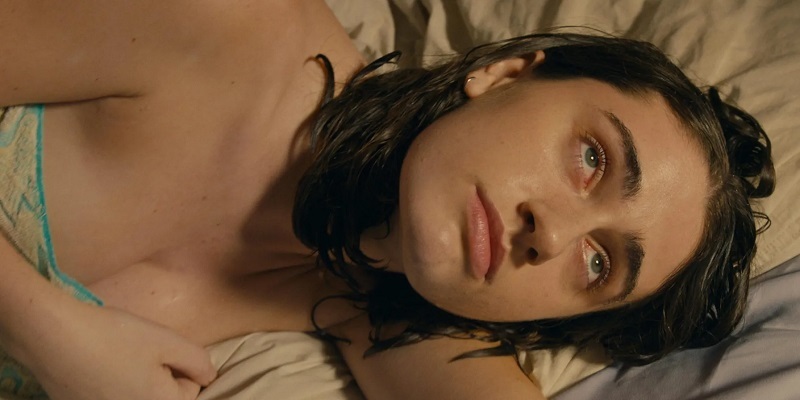
Review by
Eric Hillis
Directed by: Ally Pankiw
Starring: Rachel Sennott, Olga Petsa, Ennis Esmer, Jason
Jones, Sabrina Jalees, Caleb Hearon, Dani Kind
At some point in their career every comedic actor will inevitably
decide they need to show their range and play a "serious" i.e dramatic
role. It's usually after they've spent at least a decade establishing
their comic chops. Rachel Sennott, who burst onto the indie
comedy scene just a few years ago with her breakout role in
Shiva Baby
and cemented her reputation by being the best thing about the otherwise
unfulfilling
Bodies Bodies Bodies, isn't wasting any time. She's already making the transition to
dramatic roles with I Used to Be Funny, the feature debut of writer/director Ally Pankiw.
While the role of Sam, a young stand-up comic recovering from a
traumatic incident, gives Sennott the chance to show her dramatic range,
it also exploits her established comic talents to great effect. As such,
while the film deals with some of the darkest subject matter imaginable,
you'll find yourself grinning through much of its narrative.
We initially find Sam a morose figure, living with her best friends
Paige (Sabrina Jalees) and Philip (Caleb Hearon) but
refusing to leave their house. We learn she's been like this for quite
some time, ever since the aforementioned incident, the details of which
are gradually teased out in a manner that means I would have to enter
spoiler territory in order to discuss their specifics.

Sam is shaken out of her stupor when she sees a news report on a
missing 14-year-old girl. The girl in question is Brooke (Olga Petsa), and Sam was once her au pair. Through flashbacks we watch as Sam is
interviewed by Brooke's tightly wound cop father Cameron (Jason Jones) for the position. Brooke's mother is essentially dying in a hospital
and Cameron needs someone to both look after and befriend his daughter.
Though he struggles to connect with Sam's sense of humour, often
deployed as a defence mechanism, Cameron senses that she might be able
to break through to Brooke, and he's correct. The two young women become
the best of pals, until the "incident" shatters their
relationship.
A couple of days prior to the news breaking of Brooke's disappearance,
Sam had an uncomfortable encounter that saw the teen hurl a rock through
her window before screaming abuse at her former au pair/bff. When the
police seem disinterested, Sam takes it upon herself to track Brooke
down.

It seems initially the film is set to be a procedural with an offbeat
amateur detective, much in the manner of another recent Canadian indie,
Disappearance at Clifton Hill
(both movies share a Niagara Falls setting). Sam's investigation is the
film's weak point however, as it's largely left until the final act,
when Sam decides to act upon a clue that should have been obvious well
before that point. It also makes no sense that the police are
disinterested. Are we really supposed to believe the disappearance of
the daughter of a cop wouldn't immediately become the police force's top
priority?
Thankfully, it's easy to overlook this fudged plot point as the rest of
the film is so engaging. It's a movie of two distinct halves, one being
a feelgood friendship comedy as we warm to Sam and Brooke's sisterly
relationship, the other a dark drama about recovering from a heinous
act. What's so distinctive about Pankiw's approach is how she so
effortlessly blends the two. Despite flipping back and forward between
these disparate arcs, the movie is never tonally jarring, nor does it
ever come off as distasteful. As Sam begins to come out of her shell,
she owns her trauma through humour, and the film itself understands that
even our darkest moments can bring out a smile with a well delivered
piece of black comedy. Sam's housemates are fellow comics who have
reached the point where they still care for Sam but want her to begin to
move on, which leads to some of the movie's funniest interactions as
they subtly suggest she start paying rent or at least picking up some
toilet rolls when she's out.
But while there are laughs throughout, some of an uncomfortable
variety, I Used to Be Funny never loses sight of the
tragedy at its core. One of the movie's saddest elements is the
breakdown of Sam's relationship with her boyfriend Noah (Ennis Esmer), an ostensibly decent guy who wasn't there for her when she needed
him most. But like Lukas Dhont's recent Belgian drama
Close, I Used to Be Funny keys into the unique sadness of the
end of a platonic friendship. You may find yourself rooting for Sam and
Brooke more forcibly than if they were a pair of troubled lovers in a
rom-com.


